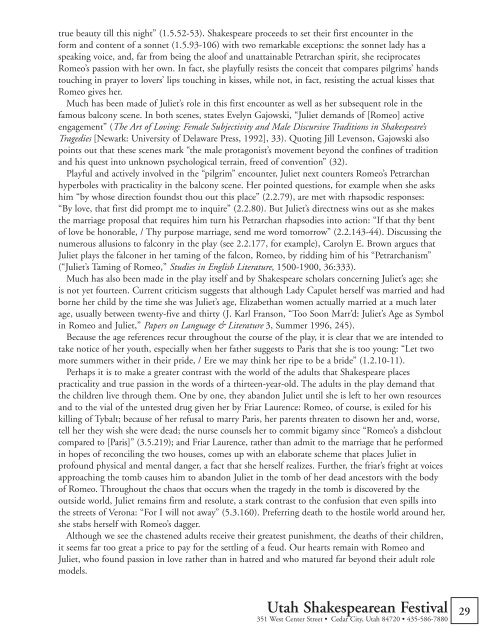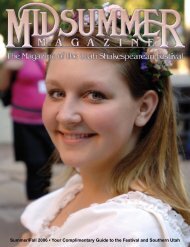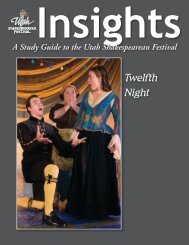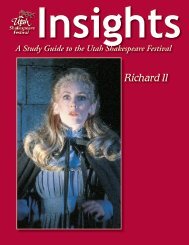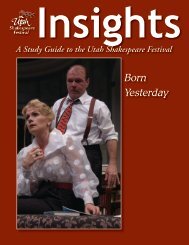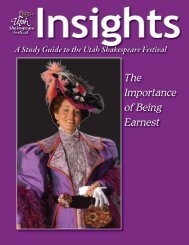Romeo and Juliet - Mr. Robertson's Bunker
Romeo and Juliet - Mr. Robertson's Bunker
Romeo and Juliet - Mr. Robertson's Bunker
Create successful ePaper yourself
Turn your PDF publications into a flip-book with our unique Google optimized e-Paper software.
true beauty till this night” (1.5.52-53). Shakespeare proceeds to set their first encounter in theform <strong>and</strong> content of a sonnet (1.5.93-106) with two remarkable exceptions: the sonnet lady has aspeaking voice, <strong>and</strong>, far from being the aloof <strong>and</strong> unattainable Petrarchan spirit, she reciprocates<strong>Romeo</strong>’s passion with her own. In fact, she playfully resists the conceit that compares pilgrims’ h<strong>and</strong>stouching in prayer to lovers’ lips touching in kisses, while not, in fact, resisting the actual kisses that<strong>Romeo</strong> gives her.Much has been made of <strong>Juliet</strong>’s role in this first encounter as well as her subsequent role in thefamous balcony scene. In both scenes, states Evelyn Gajowski, “<strong>Juliet</strong> dem<strong>and</strong>s of [<strong>Romeo</strong>] activeengagement” (The Art of Loving: Female Subjectivity <strong>and</strong> Male Discursive Traditions in Shakespeare’sTragedies [Newark: University of Delaware Press, 1992], 33). Quoting Jill Levenson, Gajowski alsopoints out that these scenes mark “the male protagonist’s movement beyond the confines of tradition<strong>and</strong> his quest into unknown psychological terrain, freed of convention” (32).Playful <strong>and</strong> actively involved in the “pilgrim” encounter, <strong>Juliet</strong> next counters <strong>Romeo</strong>’s Petrarchanhyperboles with practicality in the balcony scene. Her pointed questions, for example when she askshim “by whose direction foundst thou out this place” (2.2.79), are met with rhapsodic responses:“By love, that first did prompt me to inquire” (2.2.80). But <strong>Juliet</strong>’s directness wins out as she makesthe marriage proposal that requires him turn his Petrarchan rhapsodies into action: “If that thy bentof love be honorable, / Thy purpose marriage, send me word tomorrow” (2.2.143-44). Discussing thenumerous allusions to falconry in the play (see 2.2.177, for example), Carolyn E. Brown argues that<strong>Juliet</strong> plays the falconer in her taming of the falcon, <strong>Romeo</strong>, by ridding him of his “Petrarchanism”(“<strong>Juliet</strong>’s Taming of <strong>Romeo</strong>,” Studies in English Literature, 1500-1900, 36:333).Much has also been made in the play itself <strong>and</strong> by Shakespeare scholars concerning <strong>Juliet</strong>’s age; sheis not yet fourteen. Current criticism suggests that although Lady Capulet herself was married <strong>and</strong> hadborne her child by the time she was <strong>Juliet</strong>’s age, Elizabethan women actually married at a much laterage, usually between twenty-five <strong>and</strong> thirty (J. Karl Franson, “Too Soon Marr’d: <strong>Juliet</strong>’s Age as Symbolin <strong>Romeo</strong> <strong>and</strong> <strong>Juliet</strong>,” Papers on Language & Literature 3, Summer 1996, 245).Because the age references recur throughout the course of the play, it is clear that we are intended totake notice of her youth, especially when her father suggests to Paris that she is too young: “Let twomore summers wither in their pride, / Ere we may think her ripe to be a bride” (1.2.10-11).Perhaps it is to make a greater contrast with the world of the adults that Shakespeare placespracticality <strong>and</strong> true passion in the words of a thirteen-year-old. The adults in the play dem<strong>and</strong> thatthe children live through them. One by one, they ab<strong>and</strong>on <strong>Juliet</strong> until she is left to her own resources<strong>and</strong> to the vial of the untested drug given her by Friar Laurence: <strong>Romeo</strong>, of course, is exiled for hiskilling of Tybalt; because of her refusal to marry Paris, her parents threaten to disown her <strong>and</strong>, worse,tell her they wish she were dead; the nurse counsels her to commit bigamy since “<strong>Romeo</strong>’s a dishcloutcompared to [Paris]” (3.5.219); <strong>and</strong> Friar Laurence, rather than admit to the marriage that he performedin hopes of reconciling the two houses, comes up with an elaborate scheme that places <strong>Juliet</strong> inprofound physical <strong>and</strong> mental danger, a fact that she herself realizes. Further, the friar’s fright at voicesapproaching the tomb causes him to ab<strong>and</strong>on <strong>Juliet</strong> in the tomb of her dead ancestors with the bodyof <strong>Romeo</strong>. Throughout the chaos that occurs when the tragedy in the tomb is discovered by theoutside world, <strong>Juliet</strong> remains firm <strong>and</strong> resolute, a stark contrast to the confusion that even spills intothe streets of Verona: “For I will not away” (5.3.160). Preferring death to the hostile world around her,she stabs herself with <strong>Romeo</strong>’s dagger.Although we see the chastened adults receive their greatest punishment, the deaths of their children,it seems far too great a price to pay for the settling of a feud. Our hearts remain with <strong>Romeo</strong> <strong>and</strong><strong>Juliet</strong>, who found passion in love rather than in hatred <strong>and</strong> who matured far beyond their adult rolemodels.Utah Shakespearean Festival351 West Center Street • Cedar City, Utah 84720 • 435-586-788029


